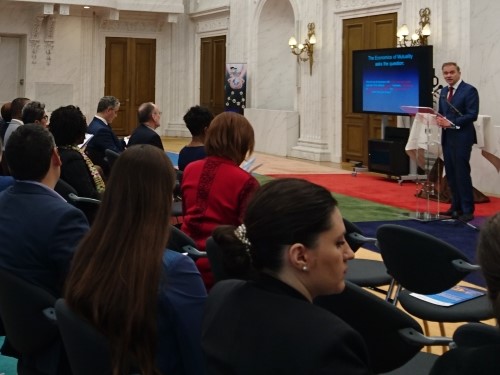Monday, April 16, 2018
“The Economics of Mutuality: Making Business and Government
Mutual.” Introduction The Economic Summit Europe meeting in The Hague and in
Amsterdam on April 12th and 13th 2018 was well received. In this meeting we
focused on the practical application of the Economics of Mutuality in business
and management practice as well as in government and public policy. For Sallux
the mutuality concept is one way to implement a relational approach to the
economy. Mutuality incorporates the ideas of sharing and trying to create
win-win situations. Day 1, Thursday April 12th, 2018 in the Dutch Parliament
Buildings, The Hague Eppo Bruins, ChristenUnie MP, the host for the day and
Arleen Westerhof (Coalition Apostolic Reform and director of the EES) welcomed
the group. In his opening presentation Eppo spoke about the fact that Bruno
Roche and his idea of the Economics of Mutuality (EoM) inspire him with a
vision of what economics and business should be. Arleen Westerhof gave a short
synopsis of the Economic Summit, its history with Economics of Mutuality and
what distinguishes it from things like Corporate Social Responsibility, Corporate
Philanthropy and the triple and quadruple bottom-lines. Wopke Hoekstra, the Minister of Finance for The Netherlands,
gave the opening address. In it, he stressed the fact that "mutuality” is
not only a term that can be applied to economics, but also to other areas of
life. He also challenged the delegates by posing questions about how applying
the idea of mutuality could help to address several very pressing situations
that the cabinet that he is a part of is dealing with right now. That is to say
pensions, organ donation and preserving the environment for future generations.
Bruno Roche spoke after Wopke and presented the Economics of
Mutuality as a viable economic model for businesses of the future. He
challenged the delegates to be proactive in this. It’s not a question of if,
but when. The survival of not only business, but also capitalism, may very well
depend on us recognizing and renumerating multiple forms of capital. Two panel discussions followed on the topics: EoM in the
Innovation Economy and Evolving the Regulatory and legal environments to make
EoM possible. Leading academics, Think Tank leaders and national politicians
spoke about what they themselves are doing to address these topics in their own
spheres of influence. Day 2: Friday, April
13th 2018 in the Dominion Centre, Amsterdam The emphasis on the second day of the meeting was on the
implementation of EoM in business and management practice. Bruno Roche and
Prof. Colin Mayer of the Said Business School at Oxford University gave the
keynote presentation in which they outlined the EoM journey that they have been
on in their Mars Catalyst - Said Oxford collaboration for the past three years.
This was followed by a presentation by Alastair Colin-Jones, a Senior Manager
of Business Research at Mars of several case studies that they have been
working on in their collaboration. The delegates were also given case studies
of their own to work on at their tables.
After the break Jan Sturesson, President of the
International Christian Chamber of Commerce and the Founder and CEO of RESTING,
gave an inspired presentation on where and how business professionals must take
a stand and have a voice in the future direction of business and society. This year we had delegates with us from the Federation of
Northern Syria. They were invited by Johannes de Jong, managing director of
Sallux. They were in The Netherlands and Belgium to try to get support as they
start to rebuild their part of Syria. We felt honoured to have them with us. Sallux thanks CAR for the great partnership in organizing
the European Economic Summit. Without the enormous hard work of the CAR team
and especially Arleen Westerhof and Martin van der Mooren the EES would not
have been possible. Finally Sallux thanks Gidsnetwerk and CBMC for their
partnership in this very successful event.

